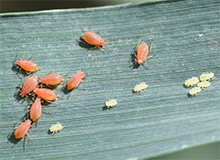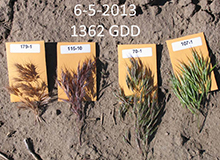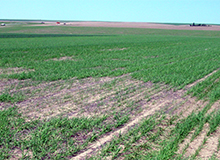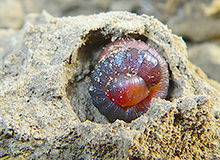
REACCH examines how changes in climate can alter the timing, geographical range, life cycles and severity of agricultural pests and beneficial organisms. Pest lifecycle data is being incorporated into crop prediction models to forecast how pests might affect cereal systems under future climate scenarios and to create a baseline for future adaption and research strategies. REACCH experiments explore current lifecycles, distribution patterns, effects, and control methods across the cereal production region for the following biological organisms:
See our products pages for posters and presentations, journal articles, and speed science handouts related to biotics. For research highlights and project impacts, explore the links below.

Insects
REACCH examines climatic impacts on insects important to wheat, including aphids, cereal leaf beetle, Hessian fly and wireworm. Scientists are considering insects as individual organisms as well as in relation to associated biological control organisms and viruses.
Related articles
Related annual report articles
- Modeling aphid population dynamics
- Cereal aphids, climate variability and change
- Update on a new aphid in Pacific Northwest
- Cereal leaf beetle under projected climates
- Wireworm biology and ecology in cereal crops
- Wireworm distribution and ecology
- Drought stress alters a host-vector-pathogen interaction

Weeds
Climatic shifts can impact weed development as well as options for controlling these economically significant pests. REACCH scientists examine current dynamics of downy brome, mayweed chamomile and Italian ryegrass to better understand how future disturbances might affect them.
Related articles
Related annual report articles

Diseases
Rhizoctonia can affect wheat roots and result in crop mortality. REACCH scientists are examining this fungus across the PNW to better understand how future climate scenarios will impact this and other soilborne pathogens.
Related articles
Related annual report articles

Beneficials
REACCH scientists are exploring the impacts of climate shifts on beneficial biological organisms such as earthworms and parasitic wasps. Because these organisms are sensitive to moisture content and temperature, changes in climate could greatly impact their lifecycles and abundance.
Related articles
Related annual report articles

